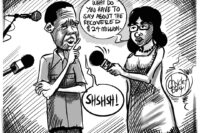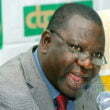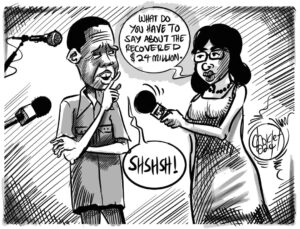FINANCE Minister Dr Bwalya Ng’andu has insisted Zambia’s sovereign debt stands at US$ 11.97 billion, saying the US$ 27 billion reported by the World Bank was from the private sector.
And Dr Ng’andu says there was a bond which was due on Wednesday but government was advised not to pay it because it was going to create a hostile environment for other creditors.
Meanwhile, Dr Ng’andu said there are prospects that bond holders will vote against government’s request for suspension of debt service payment for a period of six months.
Rendering a ministerial statement to Parliament, Thursday, Dr Ng’andu said the amount stated in the World Bank report referred to the total national debt, which included private sector external debt of US$15.57 billion.
“Our stock of external debt at the end of 2019 was as I reported in my 2020/2021 budget address which is US$11.48 billion. As at the end of June 2020, this figure increased to US$11.97 which when we add the guaranteed debt for State Owned Enterprises comes to US$ 13.55 billion. I have noted regrettably that some sections of domestic and international society that may not have read the recently related 2020 international debt statistics report by the World Bank are quoting government debt as being US$27.34 billion as opposed to US$ 11.48 billion at end of 2019. The amount stated in the World Bank report refers to the total national debt that includes private sector external debt of US$15.57 billion. Private Sector external debt is foreign denominated debt owed by all government entities in Zambia. In all sectors including mining, manufacturing, transport, energy, wholesale and trade to mention some,” Dr Ng’andu said.
“The US$ 27 billion does not reflect the sovereign debt of this country. The sovereign debt of this country is US$ 11.9 billion and that is what we are working on. The balance of that debt has everything to do with the private sector which it has borrowed. The private sector has its own obligations and responsibility to deal with that debt. The US$ 27 billion, Mr Speaker, is not my responsibility to deal with because it is not in my books,”
And when Kapombo member of parliament Ambrose Lufuma asked what would happen if the creditors refused to grant the country a moratorium, Dr Ng’andu said government would continue to engage them.
“The prospects that the bondholders might vote against are there. And we have taken that into account. If the answer is now, we will obviously continue to discuss with all the other creditors. Remember that what we have here is not just the Bond holders alone but other creditors who so far have to come to the table. We will continue to engage them in a constructive way. I do believe all creditors would like us to come to a solution that is helpful to everybody because there is absolutely no benefit for a creditor who hangs out and makes it impossible for us to resolve the problem,” he responded.
When asked by Msanzala member of parliament if the other bonds had been put on a moratorium, Dr Ng’andu said one was due on Wednesday but that government was advised against paying it.
“The notes that are payable during the period we have asked for are three coupon payments on the three outstanding bonds. The first one was due to be paid yesterday. It wasn’t paid and the reason it wasn’t paid is what I have explained on the very strong advice from our advisors. They were of the view that if we paid, we were going to create a very hostile environment within which to negotiate with other creditors because we would have departed from the principal of parri passu. So based on that, we did not make payment not because we did not have the money to pay but the issue of treating creditors equitably is a very important part of the process we are going through. There is payment that is due in January and the last payment is due in March next year. So those are the coupons that will be affected during the period of the six months standstill that we have asked for,” he said.
Dr Ng’andu told the House that engagement with other creditors had not yielded the expected results.
“Zambia is currently in the process of implementing a liability management exercise aimed at restoring debt sustainability. As part of this process, the government has been engaging its creditors to seek their approval on suspension of debt service payment for a period of six months. In accordance with terms of the G20 and the Paris Club debt suspension initiative referred to as DSSI. Mr Speaker, the request for six months standstill is part of our debt strategy development process. The standstill will give immediate relief on the budget and most importantly give government time to finalize its debt sustainability analysis that will provide details of the broad asset liability management measures that are required to be implemented to deliver debt sustainability over the medium term,” said Dr Ng’andu.
“The debt sustainability analysis will provide the details that are required to provide for informed engagement with the different creditors including the Eurobond holders on the adjustment in order to attain sustainability over the medium to long term. This will be done with the full support of the IMF. Mr Speaker, although we have obtained some relief from under the DSSI window, particularly from official creditors, engagements with commercial creditors have not yet yielded expected results. This is because creditors were concerned that we were not treating all creditors equally. We seemed to be discriminatory in the treatment of our creditors as we are servicing certain categories of our debt while not servicing others. Specifically concern was raised that the Eurobond debt was not included in the DSSI request and that Zambia had continued to service all Eurobond payments when they failed you while allowing accumulation of arrears on other portfolios.”












